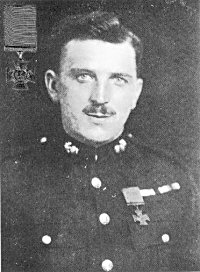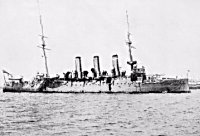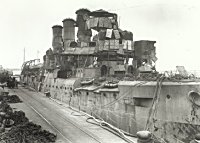
HMS Vindictive (1)

HMS Vindictive (2)

Summary of Award:
Norman Augustus Finch, V.C.
Sergeant, Royal Marines
Joined Marines: 15th January 1908
Medal Won: 23rd April 1918, Zeebrugge, Belgium
Gazetted: 23rd July 1918
Born: 26th December 1890, Handsworth, Birmingham,
Died: 15th March 1966, St Mary's Hospital, Milton, Portsmouth, aged 75
Medal: Royal Marines Museum, Eastney [red ribbon] (Bequeathed to the Corps)
Details of the Award
Serjeant Finch was second-in-command of the pompoms and Lewis guns in the foretop of Vindictive, under Lieutenant Charles N. B. Rigby, R.M.A. At one period the Vindictive was being hit every few seconds, chiefly on the upper works, from which splinters caused many casualties. It was difficult to locate the guns which were doing the most damage, but Lieutenant Rigby, Serjeant Finch and the Marines in the foretop, kept up a continuous fire with pompoms and Lewis guns, changing rapidly from one target to another, and thus keeping the enemy's fire down to some considerable extent.
Unfortunately two heavy shells made direct hits on the foretop, which was completely exposed to enemy concentration of fire. All in the top were killed or disabled, except Sergeant Finch, who was, however, severely wounded; nevertheless he showed consummate bravery, remaining in his battered and exposed position. He once more got a Lewis gun into action, and kept up a continuous fire, harassing the enemy on the mole, until the foretop received another direct hit, the remainder of the armament being then completely put out of action. Before the top was destroyed Serjeant Finch had done invaluable work, and by his bravery undoubtedly saved many lives.
This very gallant serjeant of the Royal Marine Artillery was selected by the 4th Battalion of Royal Marines, who were mostly Royal Marine Light Infantry, to receive the Victoria Cross under Rule 13 of the Royal Warrant, dated 29th January 1856
A further 6 participants in the action also received the Victoria Cross by ballot.
Further Information
In the selection of the Men to receive the Victoria Cross Rule thirteen was not strictly adhered to in this instance. It is believed that it was the intention to award just one VC and it is clear that only one ballot took place. The evidence being the results of the vote by the members of the 4th Battalion. In fact two men were awarded the Victoria Cross from the ballot held on the 26th April at the Royal Marine Depot at Deal. The ballot contained both Officers and Men of the 4th Battalion, contravening Rule 13 of The Royal Warrant for the Victoria Cross, dated the 29th of January 1856. The men were assembled on the Parade ground, where slips of voting paper were handed to those present. (It is not known whether the hospital wounded voted or not, but it is known that they were included in the ballot.) The ballot resulted in two VCs being awarded, to Sergeant Norman Finch with 91 votes and Captain Edward Bamford 64 Votes.
The Action of 23rd April 1918 near Zeebrugge, Belgium
On the 22nd and 23rd of April 1918 a battle took place at Zeebrugge in Belgium. It was mounted by two thousand men of the Royal Navy and Royal Marines under the command of Vice-Admiral Sir Roger Keyes. This port was a base for German submarines, from which they attacked and sank Allied shipping. They accounted for over a third of all the tonnage sunk in World War One. It was vital that this port was denied to them and this raid was to ensure that it was. The battle was fierce and the attacking force faced fierce opposition and suffered heavy losses. Marines and Sailors landed on the Mole and stormed the enemy defences. Whilst the fighting was in progress three 'blocking' ships (HMS Thetis, Intrepid and Iphiginia and also HM Submarine C3) were scuttled; rendering the trapped German submarines useless.
Naval Career
On 11th January 1908 Norman Finch signed on and received basic training at Eastney. For the next four years he served on various ships and shore stations and in June 1913 was promoted to Bombadier and this was soon followed by further rises to Corporal in 1915 and Sergeant in 1917. He joined the 4th Battalion on 23rd March 1918. After the war he became an Instructor of Coast Defence Gunnery and was made Colour Sergeant on 12th August 1920. Before retiring as Quarter-Master Sergeant on 26th December 1929 he spent further time at Eastney Barracks with several short spells on ships in a number of countries. In 1931 he was appointed a Yeoman of the Guard.
The Second World War brought QM Finch back to the Portsmouth Division in 1938. He appears to have spent most of the war as Quarter Master, serving as a Storekeeper Officer at 104 (Training) RM Brigade, R.M. Training Group Dalditch, then Devon. On 15th August 1945 he was released from service and in 1964 was made Divisional Sergeant-Major of HM Bodyguard of the Yeoman of the Guard
Family History
Norman Finch was born at 42 Ninevah Road, Handsworth, Birmingham on 26th December 1890 to parents John and Emma Amelia Finch. He was educated at Benson Road Board School and Grove Lane Council School, Birmingham and on 3rd April 1919 married Elizabeth Jane Ross in Birmingham. In 1921 they had a son Jack who later lived in Portsmouth. The first record we have of Norman Finch living in Portsmouth is 1920 when he seems to have been in Lawrence Road, Southsea. There is stronger evidence for him living at No. 20 Lawrence Road in 1939 and thereafter at Kings Road and Haslemere Road. By 1960 he was living at 30 Chelsea Road which is the last known address before he died in 1966 at St Mary's Hospital. He was cremated at Portchester Crematorium and his ashes were interred at South Stoneham Cemetery, Swaythling, Southampton (Section 3).
Memorials
A memorial plaque to Norman Finch was unveiled in St Andrews Church, Eastney on 23rd April 1967. The church has since been converted into housing and the memorial was removed to the Chapel in Stonehouse Barracks in Plymouth.
Portsmouth City Council named a new road in Eastney after him.
An anchor from HMS Vindictive is on display in the Memorial Garden at the Royal Marines Museum.

